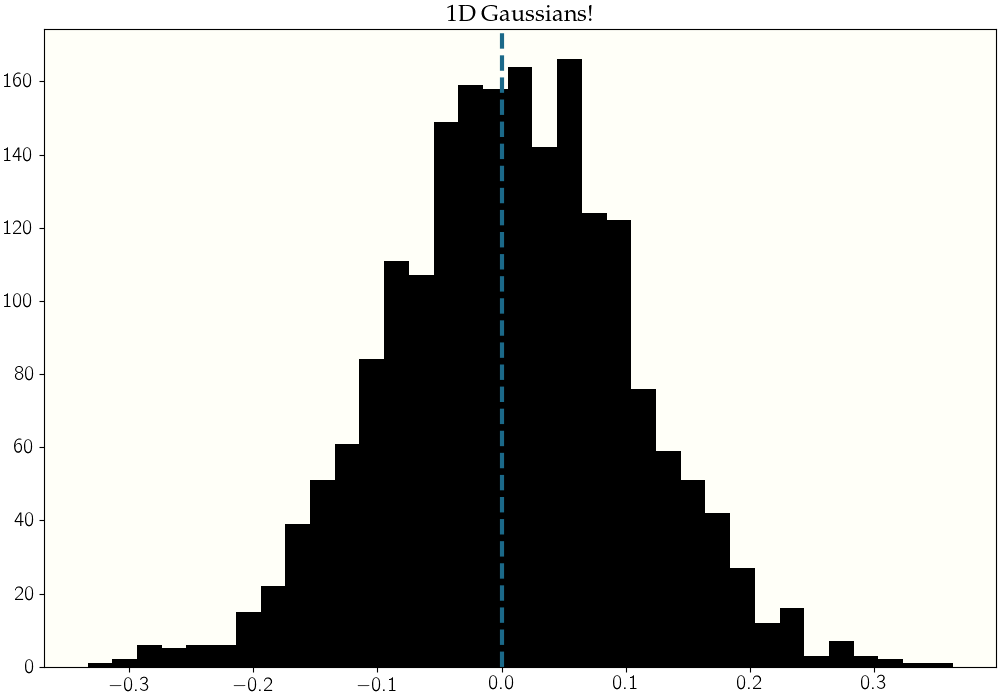This is a test library to provide reference implementations of MCMC algorithms and ideas. The basis and reference for much of this library is from Michael Betancourt's wonderful A Conceptual Introduction to Hamiltonian Monte Carlo.
The highlight of the library right now is the ~15 line Hamiltonian Monte Carlo implementation (which relies on an 8 line integrator). Both of these are commented and documented, but aim to be instructive to read.
- Step size tuning
- Leapfrog integrator
- Hamiltonian Monte Carlo
- Some log probabilities (normal, multivariate normal, mixtures, funnel)
- Divergences
- Mass matrix adaptation
- Diagnostics
- NUTS
- Empirical HMC
- Riemannian Manifold HMC Girolami & Calderhead and Betancourt
I would suggest cloning this and playing with the source code, but it can be pip installed with
pip install git+git://github.com/colcarroll/minimc.gitThe API of minimc is mimicked in minimc.minimc_slow, which returns trajectories instead of just samples. This makes for nicer images and experiments, but it is a bit slower.
import autograd.numpy as np
from minimc import neg_log_normal, hamiltonian_monte_carlo
from minimc.autograd_interface import AutogradPotential
neg_log_p = AutogradPotential(neg_log_normal(0, 0.1))
samples = hamiltonian_monte_carlo(2_000, neg_log_p, initial_position=0.)
100%|███████████████████████████████████████████| 2500/2500 [00:04<00:00, 615.91it/s]from minimc.minimc_slow import hamiltonian_monte_carlo as hmc_slow
samples, positions, momentums, accepted, p_accepts = hmc_slow(50, neg_log_p,
initial_position=0.,
step_size=0.01)
100%|███████████████████████████████████████████| 50/50 [00:00<00:00, 52.72it/s]from minimc import neg_log_mvnormal
mu = np.zeros(2)
cov = np.array([[1.0, 0.8], [0.8, 1.0]])
neg_log_p = AutogradPotential(neg_log_mvnormal(mu, cov))
samples = hamiltonian_monte_carlo(1000, neg_log_p, np.zeros(2))
100%|███████████████████████████████████████████| 1500/1500 [00:02<00:00, 623.13.92it/s]samples, positions, momentums, accepted, p_accepts = hmc_slow(10, neg_log_p,
np.zeros(2),
path_len=4,
step_size=0.01)
100%|███████████████████████████████████████████| 10/10 [00:01<00:00, 9.06it/s]from minimc import mixture
neg_log_probs = [neg_log_normal(1.0, 0.5), neg_log_normal(-1.0, 0.5)]
probs = np.array([0.2, 0.8])
neg_log_p = AutogradPotential(mixture(neg_log_probs, probs))
samples = hamiltonian_monte_carlo(2000, neg_log_p, 0.0)
neg_log_probs = [
neg_log_normal(-1.0, 0.3),
neg_log_normal(0., 0.2),
neg_log_normal(1.0, 0.3),
]
probs = np.array([0.1, 0.5, 0.4])
neg_log_p = AutogradPotential(mixture(neg_log_probs, probs))
samples = hamiltonian_monte_carlo(2_000, neg_log_p, 0.)
100%|███████████████████████████████████████████| 2000/2000 [00:09<00:00, 261.17it/s]samples, positions, momentums, accepted, p_accepts = hmc_slow(100, neg_log_p,
0.0,
step_size=0.01)
100%|███████████████████████████████████████████| 100/100 [00:07<00:00, 14.04it/s]mu1 = np.ones(2)
cov1 = 0.5 * np.array([[1.0, 0.7],
[0.7, 1.0]])
mu2 = -np.ones(2)
cov2 = 0.2 * np.array([[1.0, -0.6],
[-0.6, 1.0]])
mu3 = np.array([-1.0, 2.0])
cov3 = 0.3 * np.eye(2)
neg_log_p = AutogradPotential(mixture(
[
neg_log_mvnormal(mu1, cov1),
neg_log_mvnormal(mu2, cov2),
neg_log_mvnormal(mu3, cov3),
],
[0.3, 0.3, 0.4],
))
samples = hamiltonian_monte_carlo(2000, neg_log_p, np.zeros(2))
100%|███████████████████████████████████████████| 2500/2500 [00:11<00:00, 212.83it/s]samples, positions, momentums, accepted, p_accepts = hmc_slow(20, neg_log_p,
np.zeros(2),
path_len=3,
step_size=0.01)
100%|███████████████████████████████████████████| 20/20 [00:08<00:00, 2.31it/s]






